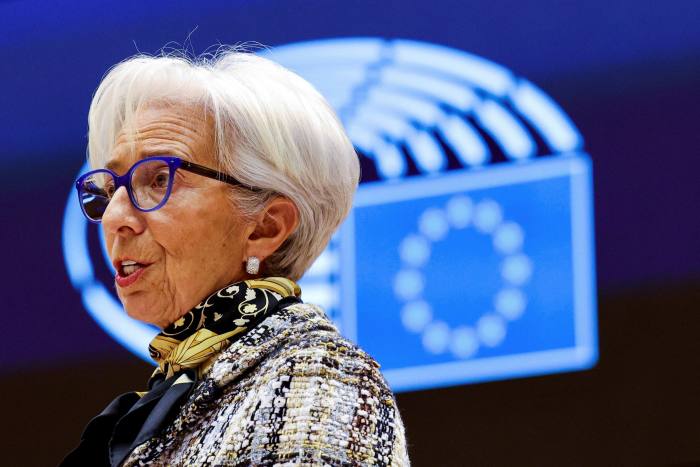European central bankers are meeting in Frankfurt on Friday to debate issues ranging from changing the European Central Bank’s inflation target to making monetary policy greener, in an attempt to recalibrate eurozone policymaking for the years to come.
The three-day retreat on the hills overlooking Germany’s financial centre — the first in-person encounter for the bank’s governing council since the start of the pandemic — will test consensus over areas that will form the backbone of a strategy review ECB chief Christine Lagarde plans to outline in September.
The meeting is “crucial for achieving the maximum possible consensus on a number of open issues”, said Yannis Stournaras, governor of Greece’s central bank and ECB council member. “By the end of the summer we will have agreed on a new strategy.”
Another ECB council member said: “We have had virtual seminars on the individual topics of the review, but we have not had the chance to talk about everything together. I think there are more areas of agreement than disagreement and this is a great chance to explore them.”
The institution decided to revisit its strategy — the first such review since 2003 — shortly after Lagarde took over from Mario Draghi in November 2019. The review is due to finish this autumn after some delay due to the pandemic.
Consensus has been building among the 25 council members — including the eurozone’s 19 national central bank chiefs — behind the idea of the ECB taking action against climate change, one of the most hotly debated questions among central bankers, insiders and analysts say.

Jens Weidmann, head of Germany’s central bank and long seen as one of the main opponents to greening its monetary policy, said for the first time this month that he would support a “decarbonising” of ECB asset purchases and collateral policy.
“Paradoxically, it seems the greater consensus will be on the greening of monetary policy,” said Maria Demertzis, deputy director of the Bruegel think-tank in Brussels. “I say paradoxically because initially that was the least expected area.”
Lagarde said this week that she hoped “climate change will have a space” in the new strategy once it is finalised, telling Politico that this “will be an indication of the fact that the ECB is attentive and capable of adjusting and adapting”.
There is less consensus over the ECB’s inflation target. Most council members agree the current target for inflation is obsolete at “close to, but below, 2 per cent” — which Lagarde said was “confusing for observers and for markets as well” — but there is disagreement over what should replace it.
Some policymakers, such as ECB chief economist Philip Lane and Finland’s central bank boss Olli Rehn, have told the Financial Times they see merit in following the US Federal Reserve’s shift to an average inflation target. This would mean allowing inflation to exceed the target to make up for a period below it.
Others say they would prefer a simpler 2 per cent target and worry that following in the Fed’s footsteps could complicate the message. One council member wondered “how would it work” in case of average inflation targeting.

There is some support for the idea of “tolerance bands” around its inflation target, similar to the Bank of England, which writes an explanatory letter to the UK chancellor when inflation goes more than 1 percentage point above or below its 2 per cent target.
The central bank is also sensitive to criticism it has heard from the public during its “ECB listens” online events, in particular the perception that monetary policy does not take enough account of the rising cost of housing.
“Housing was a key point,” Lagarde said in the Politico interview. “People were also interested in what the ECB can do to help with unemployment, and what we can do with wages.”
The ECB is likely to push for Eurostat to follow other countries by including the cost of owner-occupied housing in its inflation data — although this will be technically difficult and may take years to achieve.
Officials believe public trust in the ECB remains too low at 46 per cent — even if that is up from 40 per cent last year, according to the latest Eurobarometer survey of eurozone citizens. “We need to improve our communications, full stop,” one council member said.
To address this, the “ECB listens” events could become a permanent feature, the policymaker said, adding that its communication should be more “anchored in our understanding of the labour market” to show it cares as much about jobs as bond prices.
The governing council has not met in person since March 2020. Its members will return to Frankfurt in late July for their first in-person monetary policy meeting in 16 months.
For all the latest Business News Click Here
For the latest news and updates, follow us on Google News.
